As we head into the Thanksgiving holiday in the U.S. and year-end push throughout the entire fund finance market, we are all thinking about key trends that have emerged and how this sets up for execution next year.
A few notable themes of 2024:
- Origination makes a comeback
We are well on track to exceed 2023 origination totals, both in terms of number of deals and total lender commitments. The number of lenders involved in fund finance has returned to the 2022 peak level. To give you an idea, we have advised 78 clients YTD in the U.S. alone – the most ever in a year.

In the U.S., the year began with an uptick in amendments, mostly of the maturity extension and re-pricing variety that become a dominant theme. We closed 158 amendments during the first quarter alone. In Q2 in the U.S., we closed 189 fund finance transactions for $65.2 billion, which is a meaningful acceleration from the same period in 2023, where sponsors looked to extend facilities to lock in capital amid banking sector turmoil. The amend and extend trend has not been specific to fund finance - deal activity in the broader corporate loan market has been skewed to refinancing over new origination in 2023-2024.
In the UK, we closed 38 fund finance transactions for $13.8 billion in Q2 2024, making it the most active quarter since 2022. That meant that first half origination volume posted a 120% gain over the same prior year period for our London practice.
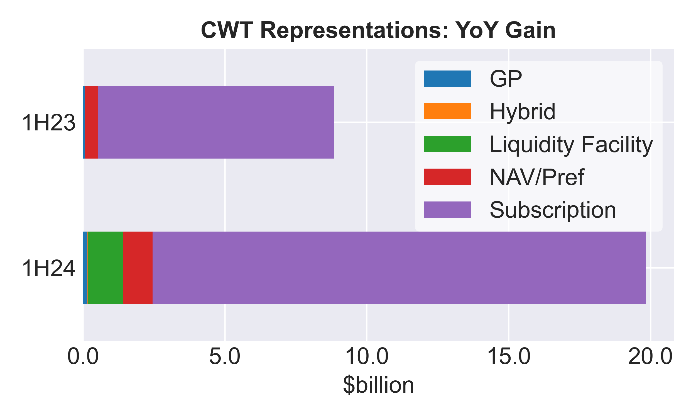
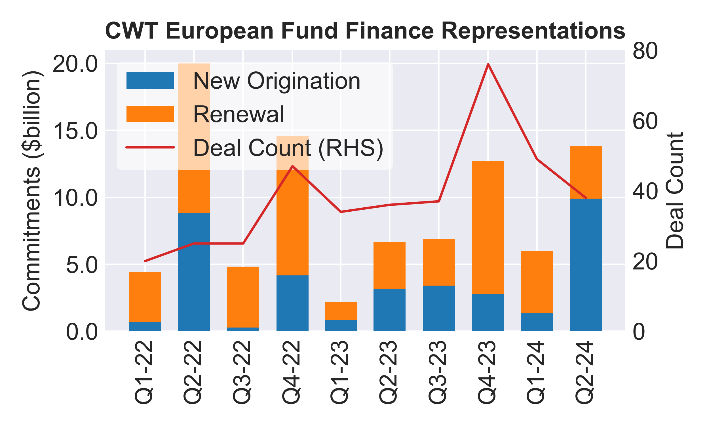
- NAV market sees material growth
We are on pace for a double-digit increase in NAV origination this year. In 2023, our NAV deal volume reached $16.7 billion. We closed $9.3 billion of NAV transactions through August 2024, and the last four months of the year have been accelerating. As you might expect, PE secondaries NAV has been a dominant asset class, but we have also seen substantial growth in the primary PE NAV space.
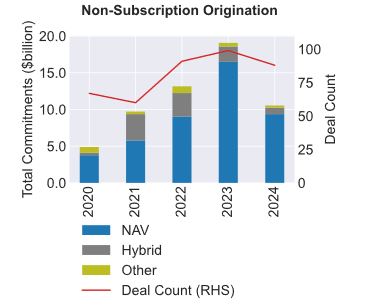
Source: Cadwalader, Wickersham & Taft LLP.
- Closing delays become the norm
Does it seem like deals are taking longer from inception to close? It’s true. On average, we are now seeing a deal take 88 days from mandate to first close— the longest on record in our dataset. This timeline also does not include pre-deal mandate time spent on the file for term sheet negotiations and diligence, and so in many cases we are looking at 4-6 months or longer. The trend is tracking the slowdown in the fundraising market generally, and there have been some outliers at both extremes. Deal timelines are likely to shorten as we head into 2025, as lower rates, less regulation and more accommodative capital markets should assist in fundraising, although the improvement is likely to be gradual.
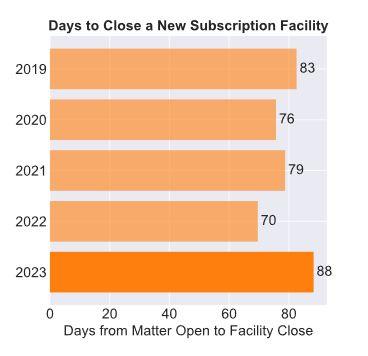
Source: Cadwalader, Wickersham & Taft LLP.
Music to borrowers’ ears: the margin-hike-at-amendment trend is easing. In 2023, nearly two thirds of amendments included an increase in pricing. Through the first 8 months of 2024, only about half of amendments have been accompanied by a margin increase and the most recent months have included an uptick in margin reductions at amendment.

Source: Cadwalader, Wickersham & Taft LLP.
About 40% of amendments in 2024 YTD have also been accompanied by a commitment downsize. This is a moderation from the 2022-2023 trend when about half of amendments came with a commitment reduction. Smaller commitment amounts reflect a function of several trends: (1) slower deal making activity for funds and a focus on limiting exposure to unused fees, and (2) for lenders, attention turning to undrawn commitments, utilization levels and return on capital.
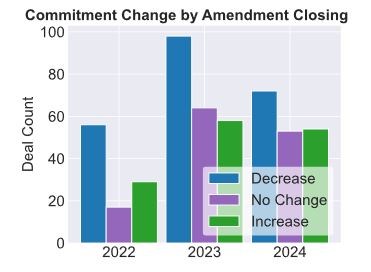
Source: Cadwalader, Wickersham & Taft LLP.
The trend in 2024 YTD has been toward tightening pricing on newly originated deals after subscription facility margins leaked wider throughout 2023. New subscription facilities in the June - August timeframe this year priced in at about 20 bps on average lower than over the prior 12 months. We continue to see gradual downward pressure on pricing.
Even with the enhanced frequency of repriced facilities at amendment over the past two years, the extension pricing average lags behind new deal pricing because there are some deals being renewed at existing margins. The average amendment margin has held about 10 bps inside the average new deal margin in 2023-2024.
The syndicated deal share rose to 16% of total deal count in 2023, reaching the highest point since 2019 - no surprise in a market where large sponsors are taking a bigger slice of the pie (pumpkin this week). However, we are seeing bilateral deal share make a comeback in 2024 YTD. By commitment size, bilateral deal origination is outpacing syndicated deals in 2024. Lender mix has changed from 2023 with mid-sized banks again becoming more active this year. While bilateral deals are winning out in overall new origination volume, syndicated deals make up 74% of total commitments in 2024 when including amendments.
Newly originated subscription facilities are smaller on average in 2024. Facilities sized at $50 million or below have made up 12% of total new deal commitments year to date, double the annual share of each of the prior three years. Re-engagement from mid-cap bank lenders has contributed to the trend, but interestingly some larger bank lenders have also originated sub-$50 million facilities.
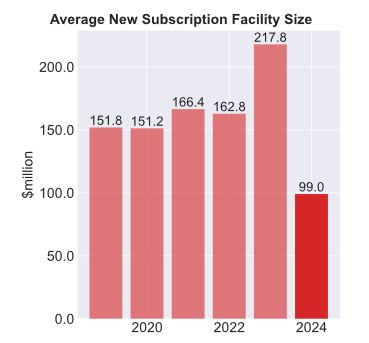
Source: Cadwalader, Wickersham & Taft LLP.
Some of the change in facility size in 2024 may simply be a function of timing, as a few larger facilities are approaching closing and likely to impact the full-year average. We estimate aggregate commitments in our U.S. subscription portfolio to total around $540 billion, with about 55% of total coming from facilities with commitments of $1.0 billion or more.
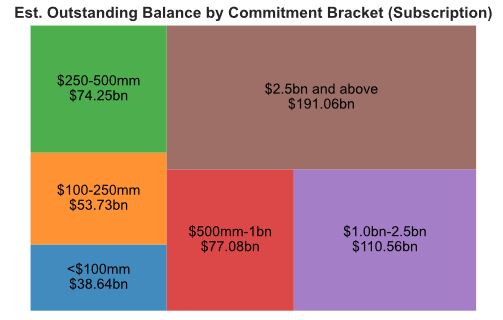
Source: Cadwalader, Wickersham & Taft LLP.
- Lender diversity hits an all-time high
Scoping in the subscription finance market by new originations from 2022-2024, we count 50 lenders in the U.S. across our representations. Number of active lenders this year has ranked in accordance with the following sub-classifications: Non-U.S. GSIBs, Cat5 Banks (technically not a supervisory category, but we use it to describe banks with less than $100 billion in assets), U.S. GSIBs, Cat4 Banks ($100-$249 billion in assets), Cat3 Banks ($250-$399 billion in total assets), Non-U.S. Banks (neither a GSIB or U.S. Bank) and Non-banks (asset managers and insurance companies) - last in terms of number of lenders we have seen active this year but a steadily growing category.
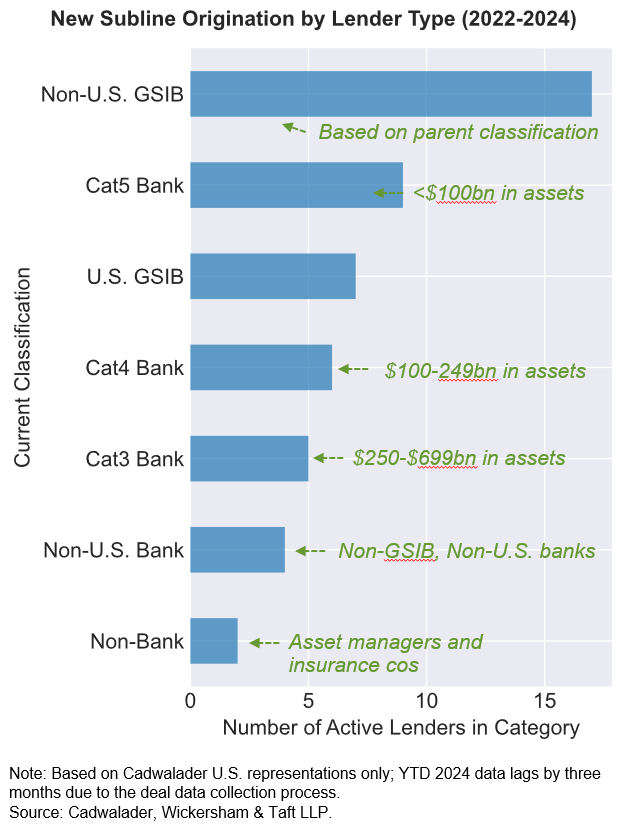
Six of the eight U.S. GSIBs have actively originated new subscription facilities after one largely exited the market in 2023. The number of deals that each lender on average originates based on our insight into the market has declined the last two years. This is not surprising as Lender breadth collapsed in 2023 with some banks retreating and fundraising pumping the brakes. Between 2022-2024, we have seen 16 different lenders serve as administrative agent on deals that were syndicated at closing.
Top sponsors are diversifying away from classic drawdown funds. Growth projections are increasingly framed around other capital sources. Multi-strategy sponsors are more than ever positioned to let the investor drive the structure rather than having the strategy constrain the vehicle. Going forward, subscription will grow with a return in fundraising but will likely capture a more limited share of overall private market growth. Lenders that can (1) attach at the asset level (e.g., repo, warehouse, ABL, and NAV), and (2) connect lending to fee income will be ideally positioned to capture maximum upside.
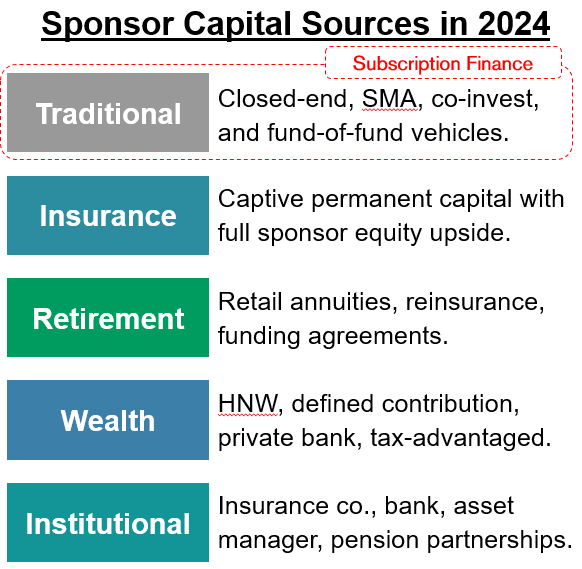
Source: Cadwalader, Wickersham & Taft LLP.
- Macro outlook is optimistic but not without challenges
Easing financial conditions have translated to improved PE deal activity. Announced deal value for Q2 2024 was the highest in two years. Distributions remain depressed, however, and the fundraising market is still highly concentrated in favor of top sponsors.
Global central banks have pivoted to easing. Lower rate and accommodative financial conditions should support further acceleration in deal activity. Also the recent and decisive U.S. election outcome is positive for the overall business outlook—many are predicting accelerated growth with the primary support coming from deregulation and lower energy costs. This could be a further positive for PE transaction volume, especially for exits and distributions. The introduction of further tariffs by the U.S. could also, from a PE perspective, present interesting reshoring investment opportunities. Over the next few months, the arm wrestle between growth and inflation/rates will be interesting to watch and may not clearly break one way or the other. However, it does seem likely that portfolio company investments and exits will accelerate, because, at a minimum, it no longer makes sense for sellers to hold on to hope for 2022 level of lower rates.
Fund finance has been living in a paradox: Bank RWA rationing has led to a sustained margin premium for subscription facilities into 2024. Utilization has taken on greater influence in lender commitment sizing. At the same time, the narrow sponsor concentration in the fundraising market has left lenders frustrated with limited origination opportunities. Regulators in the U.S. and UK have signaled a growing interest in bank lending to non-depository financial institutions. The extent to which rate cuts help bank profitability will depend, in part, on how credit (provisioning, NPL, and charge-offs) unfolds. We expect these factors to play out into a multi-speed market with differences in lending appetite between banks.
Special thanks to our director of research, Chris van Heerden and our entire fund finance team for their contributions. We will follow-up after year-end with updated insights based on how the year finishes. We hope all in the U.S. have a Happy Thanksgiving next week. We are very thankful for our clients, colleagues and friends in fund finance.